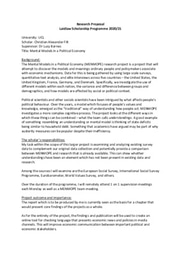Reflection on this summer's LiA activity
Over the summer I chose to work on a research project for UCL and the Laidlaw foundation once again. Since the pandemic greatly limited the opportunities for more ‘placement-type’ work experiences, I thought this would be a good option as well as necessary practice before I got to writing my third-year dissertation.
I knew I wanted to explore something that related to compromise-building in legislative institutions such as the United States Senate. Supermajority rules, such as the US Senate’s filibuster, arguably give the minority significantly more power to block the passage of laws proposed by the government (majority). Over the course of the year, many pundits started to claim that this has a negative impact on legislators’ ability to deliver promises which their voters elected them for, harming the democratic process. After discussing similar procedural rules outside the US in seminars of a module I took this year, I thought it could be interesting to examine how these claims apply to the Council of the European Union since some of its most important legislative procedures fall under the most extreme supermajority voting rule – unanimity.
Council meetings are official gatherings of either EU member states’ prime ministers or their governments’ cabinet members depending on the policy area of a proposal that is being put forth for a vote. For example, proposals that relate to financial issues are discussed in the in the Economic and Financial Affairs (ECOFIN) configuration. These debates are attended by member states’ ministers of finance or treasury secretaries. Proposals related to environmental laws are discussed at meetings of the Environment configuration that are attended by member states’ ministers of the Ecology and so on.
After finding a supervisor who had experience in researching political mechanics of Council debates – Dr Christopher Wratil – I made the decision to produce a text data report. This kind of output would help me perfect my skills in quantitative methods, which I intend on using for my dissertation, and my supervisor who is collecting text data from Council. The data collection itself consisted of me downloading video recordings of Council debates on legislative items proposed in 2017 and then uploading them to a private YouTube account to generate subtitles, which I then downloaded as text files. I focused on 5 Council configurations:
- ECOFIN
- Justice and Home Affairs
- Employment, Social Policy, Health and Consumer Affairs
- Environment
- Competition
These were chosen because of the usually higher number of laws that require a unanimous vote to pass and because they are also the configurations examined by my supervisor. After gathering all relevant text data, I individually formatted each text file so that it was clear when a representative of a country, or EU legislator was speaking.
What followed was the data analysis itself. I imported the text files into R – a programming language designed specifically for data science – and with the help of my supervisor, Google, and other online resources, built a dictionary of words and phrases that would be used to calculate the proportions of “willingness (to compromise)” and “unwillingness” rhetoric in each Council debate. These proportions were then used to create indices for the net proportion of willingness (the difference between proportions of willingness and unwillingness rhetoric) in each debate and overall amount of willingness and unwillingness rhetoric (the proportions’ sum). Values received in each of these categories – proportion of willingness rhetoric, proportion of unwillingness rhetoric, net willingness rhetoric, all willingness/unwillingness rhetoric) are then regressed against whether a debate was occurring under the unanimity rule, Qualified Majority Voting (QMV), or another passing threshold, all the while controlling for the debates’ Council configurations. After fine-tuning the regression models and getting reproducible, reliable results, I wrote the final data report which describes the methods used and puts each regression’s coefficients into context.
If anyone is interested in reading the actual report and seeing the results of my regression models, please do not hesitate to contact me directly!

Please sign in
If you are a registered user on Laidlaw Scholars Network, please sign in